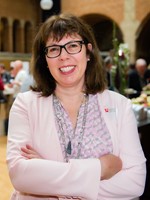

Grow Is the New Make: Bio-Making and Bio-hacking |
Listen and learn : Ed talk
Sylvia Martinez
Makerspaces are often connected to STEM/STEAM curriculum, but many areas of science have been left out -- until now. Bio-hacking, synthetic biology, growing eco-friendly materials, 3D-printed organic materials, and ethical questions raised by tinkering with the building blocks of life should be part of modern science curriculum.
| Audience: | Teachers, Teacher education/higher ed faculty, Technology coordinators/facilitators |
| Skill level: | Beginner |
| Attendee devices: | Devices not needed |
| Topic: | Emergent technologies |
| Grade level: | PK-12 |
| Subject area: | Science, STEM/STEAM |
| ISTE Standards: | For Education Leaders: Connected Learner
Designer
|
Makerspaces are often connected to STEM/STEAM curriculum, but there are many areas of science that have been left out of the conversation—until now. This session will focus on simple ways at every grade level to add biology, chemistry, and material science to making, and how the design perspective can open up new avenues for learning with and about the natural world. Bio-hacking, synthetic biology, bioplastics, growing eco-friendly materials, open-source biological tools, 3D printed biological materials, and the ethical questions raised by tinkering with the building blocks of life should be part of any modern science curriculum.
Being able to design with organic materials opens up a number of areas of science that are relevant to young people worried about the state of the planet. Students know that plastic pollution is hurting the oceans and the wildlife within. That’s a global problem that may seem unsolvable. Yet students can be a part of cutting edge science that is looking to nature to “grow” plastic replacements using natural products like mycelium, the root structure of mushrooms. Even more futuristic is synthetic biology, where students can design genetic experiments with easy to use and inexpensive toolkits.
5 min – intro
5 min – different areas of biology and chemistry that are accessible at different grade levels
10 min – materials and safety
25 min – examples and best practices from schools around the world, curriculum connections, resources
10 min – closing, questions
Invent to Learn: Making, Tinkering, and Engineering in the Classroom (book) http://inventtolearn.com
COSN Driving K-12 Innovation Report (previously called the NMC Horizon Report): 2019 K-12 Edition
https://cosn.org/VisionToAction
DIYBio.org – Website for Do It Yourself Biology resources and research
Nest Makerspace https://nestmakerspace.weebly.com – Makerspace for teens focusing on bio-hacking and bio-making
Evocative Design https://ecovativedesign.com – growing fungus-based organic materials to replace petroleum based materials.
NASA resources for grown materials https://www.nasa.gov/directorates/spacetech/niac/2018_Phase_I_Phase_II/Myco-architecture_off_planet/
Synthetic Biology - https://www.synbioproject.org/
Circular Design https://www.circulardesignguide.com

Sylvia Martinez, a former aerospace engineer, is co-author of the book, Invent to Learn: Making, Tinkering, and Engineering in the Classroom, called “the bible of the classroom maker movement.” Sylvia speaks to and works with schools around the world and is president of Constructing Modern Knowledge Press, creating books and professional development advocating using modern technology for learning. Sylvia is also the principal advisor to the NSF-funded FabLearn Fellows program at Columbia University. Prior to that, Sylvia ran the educational non-profit Generation YES, designed and programmed educational software and video games, and designed GPS navigation and high frequency receiver systems.